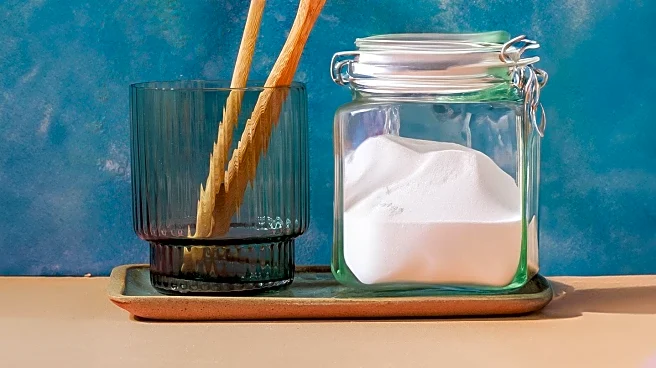What's Happening?
Researchers at the University of Nottingham have developed a groundbreaking gel capable of repairing and regenerating tooth enamel, potentially revolutionizing dental care. The bioinspired compound, created
by the School of Pharmacy and Department of Chemical and Environmental Engineering, is designed to restore enamel that has been eroded or demineralized. Unlike traditional fluoride treatments, this gel uses proteins that mimic those responsible for enamel formation early in life. When applied, it forms a durable layer that integrates with the tooth structure, capturing calcium and phosphate ions from saliva to regenerate enamel through epitaxial mineralization. This innovation not only restores enamel but also reduces tooth sensitivity and improves the bonding of dental restorations.
Why It's Important?
The development of this enamel-regenerating gel is significant as it addresses a major issue in dental health—enamel damage, which affects nearly half of the global population. Enamel loss leads to increased vulnerability to infections, cavities, and tooth loss, which are linked to broader health conditions like diabetes and cardiovascular disease. Current dental treatments focus on prevention or temporary protection, but this new gel offers a lasting solution by actually rebuilding enamel. If commercialized, it could provide a simple, safe, and effective method for maintaining stronger, healthier teeth, potentially reducing the prevalence of dental decay and associated health issues.
What's Next?
The researchers are optimistic about the practical application of this technology, with plans to commercialize it through their start-up company, Mintech-Bio. They aim to release a product by next year, which could soon be available to patients worldwide. The gel's versatility opens opportunities for various dental products to help patients of all ages suffering from enamel loss and exposed dentine. As the technology is designed with clinicians and patients in mind, it promises to be safe, easily applicable, and scalable, potentially transforming dental care practices globally.
Beyond the Headlines
This innovation could lead to a shift in dental care practices, moving from preventive measures to restorative solutions that mimic natural processes. The ethical implications of using bioinspired materials in medicine could spark discussions on the integration of biotechnology in healthcare. Additionally, the gel's fluoride-free composition may appeal to those concerned about fluoride use, offering a natural alternative for dental health maintenance.










